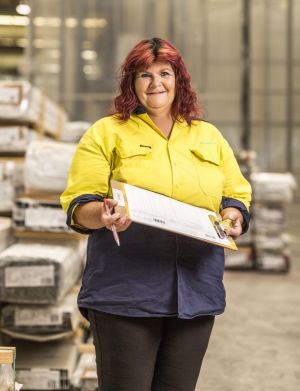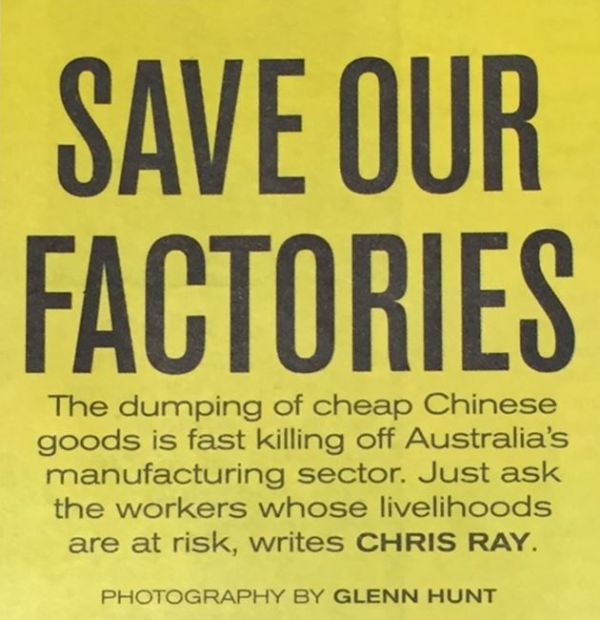Sapphire is proudly Australian owned and uses aluminium produced in Australia and New Zealand only.
Why do we do this you ask ? , because we believe in products that are certified safe and comply with Australian standards which means you can be assured that a product made and delivered by Sapphire is made in Australia by Australians.
Support buy Australia
————————————————————————————————————————————————————————————————————————
Love your work: Pat Keyworth, a team leader at Capral Aluminium. Photo: Glenn Hunt
She badly needed the job, but it took time to gather the courage to phone and enquire. Would the new factory employ a woman, or was it men only? “Put in a resumé – the more women the better,” said the personnel officer at Capral Aluminium.
Pat Keyworth, school-leaver at 15, mother of three, was the first woman hired for the dispatch department of Australia’s biggest aluminium extrusion plant when it opened near Ipswich, 40 kilometres west of Brisbane in 2004. A few men mocked her early attempts to load trucks with a forklift. “They were really harsh on me. There were times when I went to the toilet and cried. Then I thought, ‘No, I’m not going to let a man beat me.’ So I went back out there until I did it right.” Her detractors didn’t last and Keyworth was promoted to team leader on the afternoon shift. “I never thought I’d get to be a boss,” she says, still sounding surprised.
Women now work alongside men in most sections of the plant, including anodising, painting, stacking, packing and dispatch. As permanent employees in a traditionally unionised industry, they get above-average wages and working conditions. But it is rare for Capral to take on new permanent employees, male or female, these days.

Capral plant manager Sven Gade. Photo: Glenn Hunt
The plant – state of the art when built at a cost of $160 million – operates at less than 60 per cent capacity. The workforce is down to 300, a loss of 150 jobs in five years. Nationwide, almost 800 positions have gone. A decade ago, Capral made 60 per cent of all the extruded aluminium sold in Australia. It is still the biggest domestic producer but its market share has crashed to 30 per cent.
Every Australian maker of aluminium extrusions and finished products is struggling. All blame predatory competition from China, the world’s biggest aluminium producer. They claim it is dumping product at below the cost of production, in breach of world trade rules, in order to drive Australian companies out of business and control the market.
“It is easy to dismiss us as inefficient manufacturers looking for an easy ride,” says Capral director Phil Jobe. “But if mainstream Australia knew what long-term damage dumping is inflicting on Australia’s industrial base, they would be outraged.”

Neville Singh, who has worked for Capral since he was 19 years old. Photo: Glenn Hunt
At Ullrich Aluminium, a Capral competitor, CEO Gilbert Ullrich estimates that Chinese imports have grabbed 55 per cent of the market for extruded aluminium, worth more than $1 billion annually. “You don’t get that in just a few years by playing by the rules,” he says. Ullrich fears that the jobs of his 325 Australian employees are “clearly at risk” from dumping. “I believe in free trade but also fair trade. Once the Chinese take over the sector, they will put their prices up.”
Across a wide spectrum of industries, unrestrained imports are killing Australian manufacturing. The issue goes beyond dumping to include imports that fail Australian quality and safety standards and come with fraudulent labels and certificates. China is the main offender. “It’s a nightmare and it’s getting worse,” says Tracey Gramlick, chair of the Building Products Innovation Council. “Many Australian manufacturers are closing down because they can’t compete.”
Occasional news reports hint at the scale of the problem: sheets of imported glass crack and fall off Canberra’s new ASIO HQ; Chinese electrical cable is declared a fire risk, requiring up to 40,000 homes to be rewired; inspectors shut down a Sydney unit development over dangerous, imported formwork plywood; hundreds of tonnes of inferior gantry steel from China are sent for scrap at a Melbourne freeway project.

Capral apprentices John Shorter and Anthony Smith.Photo: Glenn Hunt
Manufacturers supplying the building and construction industry are among the hardest hit; 45 per cent of them tell the Australian Industry Group (AIG), a major employer lobby, that “non-conforming” products are hammering their revenues, margins and employment levels. “This issue is affecting the very viability of legitimate businesses. Jobs are being lost now and we are seeing a downward spiral of product quality and conformity,” warns the AIG.
Manufacturing’s plight is the flip side to the excitement generated by Australia’s deepening commercial engagement with China. The first Australia-China free trade agreement (FTA), signed in November, would “set Australia up for the decades ahead”, declared Trade Minister Andrew Robb. While commentators gushed over concessions apparently granted to Australian service industries – banks, insurers, lawyers, architects and education providers – and some farm sectors, the agreement also kicked away the remnants of a tariff regime that nurtured Australian manufacturing.
“The FTA will benefit low-employment agriculture and mining while destroying jobs in high-employment manufacturing,” warns Tom Skladzien, economic adviser to the Australian Manufacturing Workers’ Union (AMWU). This concern is reinforced by employer sentiment: an AIG survey finds just over half of all local manufacturers expect to be hurt by the removal of tariffs. Only 11 per cent believe they will benefit from cheaper imported components and raw materials.

Ipswich Mayor Paul Pisasale. Photo: Glenn Hunt
Capral turns primary aluminium, one of the most useful of metals, into components for products as diverse as window frames and yacht masts, curtain tracks and scaffolding. At first glance, it doesn’t look like a business on its knees. Six times a day on average, trucks hauling grey metal logs as big as power poles enter the factory gates. They come from Gladstone in central Queensland, where bauxite mined 2000 kilometres away at Weipa, on Cape York Peninsula, is refined to produce alumina, then smelted into primary aluminium.
At Capral, inside a shed the size of several football fields, Neville Singh oversees the powerful hydraulic presses where log, also called billet, is softened by heating, then pushed through a precision opening in a steel die to form shapes, rather like squeezing toothpaste. It is noisy and hot but Singh, 50, has been around the giant machines since starting with Capral’s predecessor, Alcan, as a 19-year-old.
“I was an unskilled teenager and this industry secured my future,” says Singh, clearly proud, in his earnest and carefully spoken way, of the business he followed from Sydney to Brisbane then Ipswich. Now second in charge of the extrusion department, Singh learnt all the press jobs: die man, who loads the die into the press with a crane; control-panel operator; stretcher, who straightens the extrusion after it exits the press; circular-saw operator, who cuts the profile into lengths.
There is a bit of an empty feel about the place, despite the roar of machinery. Capral used to run all four presses six days a week. Now, usually two, and never more than three, operate over five days. To help cover costs, part of the plant is sublet to a firm making soft drinks. Capral has also cut manning levels on each press from 10 to four by automation, adopting more flexible work practices and making everyone responsible for quality control. “You can’t get any leaner than this,” Singh insists.
He admits to feeling demoralised when customers switch to buying bulk from China and only turn to Capral for top-ups. “One day we could be processing 100 tonne of aluminium, the next day 50 tonne. We give our customers top-quality product as fast as they need it. But I don’t see how we can ever compete if the Chinese are allowed to keep dumping metal.”
Singh and his wife, Kalwinder, a kitchen hand, have no children but he worries about young people’s job prospects. “So many kids come here as casuals, keen and willing to learn. But the market doesn’t give us the opportunity to hold on to them as permanents.”
Plant manager Sven Gade credits Capral’s main union, the Australian Workers’ Union, for helping to keep the business afloat without retrenchments by negotiating flexibilities. “We run as efficiently as any plant in the world but we will never be fully utilised without effective anti-dumping measures,” says Gade, a German-educated engineer who moved to Australia in the 1990s.
Chinese aluminium producers rely on imported raw materials, including bauxite, alumina and coal from Australia. How do they manage to undercut Australian manufacturers in their own backyard?
The answer isn’t just lower wages: cheap factory labour made China the workshop of the world, but aluminium is a capital-intensive business. “China is one of the highest-cost aluminium billet producers but their industry is massively subsidised at every stage of production,” says John Heslop, a forensic accountant and anti-dumping specialist.
Heslop says billet production costs China about $3000 a tonne – one-third above the global average – but government subsidies bring that below $2000 a tonne. “It’s scandalous that Australian industries are expected to surrender local markets and disappear under the impact of such unfair competition. I am absolutely distressed at the impact on our manufacturing industry.”
In 2010, Capral was “bitterly disappointed” when Australian authorities applied anti-dumping duties averaging only 7 per cent on extrusions from China, way below US and Canadian duties, which mostly ranged from 30 to 60 per cent. In 2013, the former Labor government responded to appeals from manufacturers and unions by creating an Anti-Dumping Commission (ADC) with greater powers and tougher penalties.
Backed by other Australian producers, Capral asked the ADC to penalise Chinese companies it claimed had simply absorbed the 2010 duties and continued to sell at a loss. Last week, Capral got welcome news; commissioner Dale Seymour found the biggest Chinese exporter, PanAsia Aluminium, had indeed “circumvented” anti-dumping measures and the Industry Minister, Ian Macfarlane, approved a steep rise in duties. Macfarlane did not disclose the new number but it is believed to be more than 55 per cent – an unprecedented high.
“This is a pivotal decision for Capral and quite a turnaround from previous anti-dumping decisions,” Phil Jobe says. “We are very pleased. It shows the new anti-dumping regime is working and demonstrates a commitment by the Australian government to ensure fair trade for Australian manufacturing.” He cautions, however, that the decision must now be policed to stop importers avoiding higher duties.
In a related action still to be determined, Capral has asked the ADC to impose additional “countervailing duties” to offset Chinese government subsidies including low-interest loans, cheap land rent, cut-price electricity and tax exemptions. Capral’s subsidy claim is controversial because it implicitly challenges Australia’s decade-long recognition of China as a “market economy”, despite evidence that production costs in many sectors are artificially lowered by government policies and subsidies, not the forces of supply and demand.
China insisted on market economy status as a precondition for entering negotiations on the trade agreement. But most of China’s major trading partners, including the European Union, the US and Canada, continue to classify it as a non-market economy. That makes it much easier for Chinese firms to be found guilty of dumping.
World Trade Organisation rules provide for a “surrogate country” approach to determine the “fair value” of imports from a non-market economy. US authorities typically use Indian production costs to establish the “real” cost of producing goods in China. If the Indian cost exceeds the Chinese export price, the Chinese product can be hit with duties.
The US aluminium extrusion industry is enjoying a resurgence, thanks to duties averaging 33 per cent but ranging as high as 400 per cent on Chinese product. China managed to capture 20 per cent of the US market by late 2009 but duties imposed since 2010 have crunched that to less than 1 per cent.
China has lifted more than half a billion people out of poverty in scarcely a generation. Its guiding economic principles include owning as much of the production chain as possible, maximum value-adding, and a team approach aimed at controlling markets. Profits may be postponed in the certainty that eventual control will deliver greater prizes.
In its trade agreement with Australia, China has agreed to open up sectors like beef and dairy because it cannot satisfy domestic demand without imports. As Dr John Lee, of Sydney University’s Centre for International Security Studies, has pointed out, China is buying Australian farms and processing plants to help meet domestic demand from its own assets. “China remains only partially committed to free and open trade as a tactical fix to increase the competitiveness of the Chinese economy and Chinese firms,” Lee writes.
Australia takes a more theoretical stance. Its “fundamentalist” approach has earned it international notoriety as “the free-trade Taliban”, according to South Australian Independent Senator Nick Xenophon, who campaigns for tougher protection against dumping.
Xenophon is angry that federal government policy outlaws preference being given to Australian suppliers in procurements worth some $40 billion a year. The policy ignores broader value-for-money issues like product quality and longevity, jobs and local spending, he says. “We have to stop being mugs,” he told the Senate. “Other countries are laughing at us for being such purists about free trade.”
In contrast, the US government was required by law to spend its entire post-GFC stimulus package on local goods and services. This colossal Buy American campaign was only modified to accommodate Canadian firms after their government objected. “The whole arrangement violated the Australia-US free-trade agreement and we didn’t raise a peep,” says the AMWU’s Tom Skladzien. “If you proposed a similar policy in Australia, our bureaucracy would be up in arms because it would violate trade agreements. Well, everyone else does it.”
John Heslop says it’s time experienced manufacturing executives had a say in trade matters. “Australian trade policy is mainly informed by theorists; people with no practical knowledge of, or executive experience in, manufacturing or international trade at the enterprise level,” he says.
Pat Keyworth is nervous about our interview. Her words tumble out until she finds enough composure to relax. “I was very shy when I came to Capral, so I did a communications course to learn to talk in front of people,” she explains. At 50, Keyworth is paying off a mortgage while supporting an unemployed son. She earns about $1100 a week – “a good wage for Ipswich” – and appreciates workmates who are “like family to me. They’ve helped me through the bad times, like when I broke up with my husband.”
Learning skills in a supportive workplace has given her confidence to take charge of difficult situations, such as dealing with truck drivers who breach safety policy by entering the loading exclusion zone. “Some drivers don’t like a woman telling them what to do, but I’d hate to see a load fall on one of them,” she says. Keyworth introduces a casual member of her team, Justin Watson, who started a fortnight earlier, filling in for someone off sick. The 22-year-old is on the books of a labour-hire agency. Capral is his fifth placement in four years. “It’s tough to get a permanent job in Ipswich,” he says. “It would be nice to get stable pay every week and not have to worry about money all the time. Down the track, I’d like to get a loan to buy a house.”
Youth unemployment reached an average 20 per cent in Ipswich last July, making it one of the hardest places in Australia to get a job for 15- to 24-year-olds. Keyworth says some young people “blame us baby boomers because we won’t leave our jobs. The real problem is so many factories have closed down.”
Statistics support that view. Manufacturing now employs just eight per cent of the Australian workforce – about 910,000 workers – compared to 14 per cent 20 years ago. More than 80,000 manufacturing jobs disappeared in the last five years.
Losses on that scale have a wide impact. Each job in manufacturing generates between two and five jobs in the rest of the economy, according to Goran Roos, Professor of Business and Strategic Design at Swinburne University of Technology.
Discussion about what happens to a country that no longer makes things might also consider the quality of jobs. Professor of Management at the University of Melbourne, Peter Gahan, has noted that despite increasing casualisation, more than 80 per cent of manufacturing jobs remain full-time. Most of these come with full employee benefits, including paid leave, which he calls a “key indicator” of job quality. By comparison, less than half the construction workforce and only one third of hospitality workers get paid leave.
“Pick your own cup – any cup,” urges Paul Pisasale, sweeping an arm down a corridor inside Ipswich City Council chambers. The long-serving mayor is about to brew espresso, but first shows off his world-record collection of more than 1500 short-black or demitasse coffee cups. They’ve become a tourist attraction, though when the Guinness Book of Records certified them in 2008, there were a mere 650 cups. As he makes coffee inside his cluttered office, Pisasale assures Good Weekend that the record will stay in Ipswich because people keep donating to the collection.
Pisasale may reasonably claim another record: Australia’s most popular politician. He was re-elected as an independent for a third term in 2012 with 88 per cent of the primary vote, a result he attributes to his focus on jobs. In 2002, Pisasale heard that Capral’s attempt to open an extrusion plant near Sydney had run into resident opposition. The up-and-coming alderman seized the opportunity to attract an anchor tenant for a new industrial estate, Bremer Business Park, developed to help replace the region’s collapsing industrial foundations of wool-processing, coal mining and railway workshops. “I got development approval for Capral in six weeks,” Pisasale says.
His pro-development line is not universally popular. When Ipswich residents complain about noise from Amberley air force base, the usually gregarious Pisasale bluntly tells them: “If you don’t like it you should shift, because 6500 people work on that base.”
But supporters say his jobs-first approach has helped transform a city once derided as Brisbane’s poor cousin to the fastest-growing local government region in Queensland. “Twenty years ago, we were a laughing stock,” Pisasale says. “They called us ‘Two-Head City’. Now kids are proud to say they live in Ipswich.”
Pisasale knows his city’s 200,000 residents are unusually dependent on manufacturing. The sector employs almost 18 per cent of the local workforce, double the state average. He is scornful of politicians and economists “who prattle on about level playing-fields when other countries are helping their manufacturers to destroy Australian industry and dominate our market”. And if unfair import competition is not controlled? “It’s goodbye Capral, and goodbye Australian manufacturing.”
During our interview, Pisasale puts in a phone call to David Kemp, CEO of the BDS Group, a local business. “If you want to know what imports are doing to industry around here, speak to David. He’s the last manufacturer of steel shelving in Australia.”
Kemp employs 150 people at Logan City, bordering Ipswich. “This country had a dozen shopfitting operations like mine, employing thousands of people,” he says. “Imports have forced all of them to stop manufacturing in Australia, except me. My competitors are now importers, working out of small warehouses bringing in container-loads of shelving. Some of it is full of leaded paint, which has been banned here on health grounds for 12 years. It gets sold here because imports are not inspected.”
We have the minerals and skills, but we just want to give the rest of the world our raw materials and wait for the finished product to come back. How dumb is that?” asks Anthony Smith. He and John Shorter, both in their mid-40s, are “mature- age” apprentices learning die correction at Capral.
Smith is talking about Capral’s decision to buy some aluminium log from the Middle East after a smelter at Kurri Kurri in NSW shut down in 2012 with the loss of 450 jobs. He sees the closure as another sign that Australia, the world’s leading bauxite producer, is losing its capacity to add value to this bounty by processing.
Shorter calls die correction “a bit of a black art”. It is an uncommon trade focused on extruding aluminium at optimum speed and “on shape”. If the press runs too fast, it can ruin the aluminium’s surface finish and shape. Too slow, and the job may be unprofitable.
Smith and Shorter control the speed by making minute adjustments to openings in the die. The work challenges their eyesight and hand skills. They make measurements with a $200,000 scanner accurate to within 0.1mm, as well as traditional devices such as callipers and pin gauges, before adjusting gaps in the die using grinders as small as a dentist’s drill.
Shorter worked at Capral for seven years before getting the chance to gain trade qualifications and higher pay when a vacancy arose in the die shop. He would like his sons Nicholas, 14, and Jack, 10, to also learn a trade. “But will Australia have a manufacturing industry in 10 years’ time?” he asks.
Smith says he gets the impression governments don’t care about manufacturing jobs. “They talk as if getting rid of manufacturing will allow everyone to step up. But it’s more likely people will get pushed down.” In Ipswich, he says, permanent factory jobs can get you “a half-decent wage. If you manage to get a bit of overtime, it puts you in the middle.”
John Shorter knows import competition could destroy his industry but hopes governments will act to keep Australian manufacturing alive with “fair anti-dumping laws, so we can compete on a level playing field”.
As Sven Gade said before Capral’s anti-dumping win last week: “Australia needs to develop a backbone and take a stand.” The tough new penalties against Capral’s Chinese competition suggest that in the aluminium industry at least, Australia is hardening its stance.


